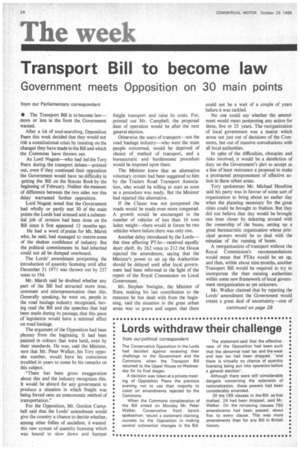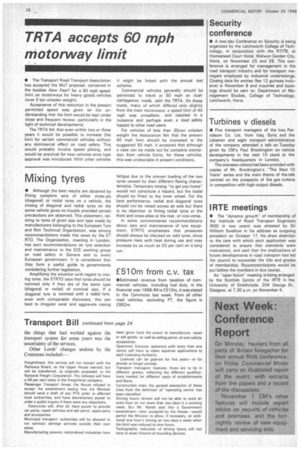Transport Bill to become law
Page 26

Page 30

If you've noticed an error in this article please click here to report it so we can fix it.
Government meets Opposition on 30 main points
from our Parliamentary correspondent • The Transport Bill is to become law— more or less in the form the Government wanted.
After a lot of soul-searching, Opposition Peers this week decided that they would not risk a constitutional crisis by insisting on the changes they have made to the Bill and which the Commons have thrown out.
As Lord Nugent—who had led the Tory Peers during the transport debate—pointed out, even if they continued their opposition the Government would have no difficulty in getting the Bill on the Statute Book by the beginning of February. Neither the measure of difference between the two sides nor this delay warranted further opposition.
Lord Nugent noted that the Government had wholly or partly met 30 of the main points the Lords had stressed and a substan tial job of revision had been done on the Bill since it first appeared 12 months ago. He had a word of praise for Mr. Marsh who, he said, had managed to restore some of the shaken confidence of industry. But the political commitments he had inherited could not all be dumped overboard.
The Lords' amendment postponing the introduction of quantity licensing until after December 31 1971 was thrown out by 237 votes to 194.
Mr. Marsh said he doubted whether any part of the BM had attracted more time, comment and misrepresentation than this.
Generally speaking, he went on, people in the road haulage industry recognized, hav ing read the Bill and the speeches that had been made during its passage, that this piece of legislation would have a minimal effect on road haulage.
The argument of the Opposition had been phoney from the beginning. It had been
painted in colours that were lurid, even by their standards. He was, said the Minister, sure that Mr. Peter Walker, his Tory oppo site number, would have his conscience troubled in years to come by his remarks on this subject.
"There has been gross exaggeration about this and the industry recognizes this.
It would be absurd for any government to produce a situation in which freight was being forced onto an uneconomic method of transportation."
For the Opposition, Mr. Gordon Campbell said that the Lords' amendment would give the country a chance to decide whether, among other follies of socialism, it wanted this new system of quantity licensing which was bound to slow down and hamper freight transport and raise its costs.. For, pointed out Mr. Campbell, the proposed date of operation would be after the next general election.
Otherwise the users of transport—not the road haulage industry—who were the main people concerned, would be deprived of choice of method of transport, and a bureaucratic and burdensome procedure would be imposed upon them.
The Minister knew that an alternative voluntary system had been suggested to him by the Traders Road Transport Association, who would be willing to start as soon as a procedure was ready. But the Minister had rejected this alternative.
If the Clause was not postponed the roads would be made even more congested. A growth would be encouraged in the number of vehicles of less than 16 tons laden weight—there would in future be two vehicles where before there was only one.
Another delay introduced by the Lords— this time affecting PTAs—received equally short shrift. By 262 votes to 212 the House rejected the amendment, saying that the Minister's power to set up the Authorities should be delayed until after local government had been reformed in the light of the report of the Royal Commission on Local Government.
Mr. Stephen Swirtgler, the Minister of State, making his last contribution to the measure he has dealt with from the beginning, said the situation in the great urban areas was so grave and urgent that there could not be a wait of a couple of years before it was tackled.
No one could say whether the amendment would mean postponing any action for three, five or 25 years. The reorganization of local government was a matter which arose not just out of decisions of the Commons, but out of massive consultations with all local authorities.
In spite of the difficulties, obstacles and risks involved, it would be a dereliction of duty on the Government's part to accept as a line of least resistance a proposal to make a protracted postponement of effective action in these urban areas.
Tory spokesman Mr. Michael Heseltine said his party was in favour of some sort of organization to bring about an earlier day when the planning necessary for the great cities could be brought to fruition. But they did not believe that day would be brought one hour closer by tinkering around with the ownership of the buses, setting up a great bureaucratic organization whose principal powers would be to deal with the minutiae of the running of buses.
A reorganization of transport without the Royal Commission's recommendations would mean that PTAs would be set up, and then, within about nine months, another Transport Bill would be required to try to incorporate the then existing authorities within some new framework of local government reorganization as yet unknown.
Mr. Walker claimed that by rejecting the Lords' amendment the Government would create a great deal of uncertainty—one of
the things that had worked against the transport system for some years was the uncertainty of the services.
Other Lords' changes undone by the Commons included:
Freightliners: this service will not remain with the Railways Board, as the Upper House wanted, but will be transferred, as originally proposed, to the National Freight Corporation. The railways will have a 49 per cent stake in the Freightliner company. Passenger Transport Areas: the House refused to accept the amendment saying that the Minister Should send a draft of any PTA order to affected local authorities, and have discretionary power to .order a public inquiry if there were any objections.
Executives will, after all, have power to provide car parks, repair vehicles and sell petrol, spare parts and accessories.
Municipal transport: authorities will be allowed to run contract carriage services outside their own
areas.
Manufacturing powers: nationalized industries have been given back the power to manufacture, repair or sell goods, as well as selling petrol, oil and vehicle accessories.
Operators' licences: operators with more than one centre will have to make separate applications to each Licensing Authority.
Licences can be granted for five years—or for shorter or longer periods.
Transport managers' licences: these are to be in different grades, reflecting the different qualifications needed for different types of establishments and fleets.
Construction sites: the general exemption of these sites from the definition of "operating centre' has been cancelled.
Driving hours: drivers will not be able to vvork an extra hour on not more than two days in a working week. But Mr. Marsh said that a Government amendment—later accepted by the House—would permit the Minister to allow, if necessary, an additional one hour's driving on two days a week when the limit was reduced to nine hours.
Tachographs: reduction of driving hours will not have to await fitment of recording devices.
















































































































